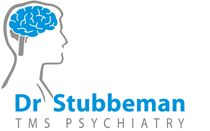
Archives


Pilot Study: New Approach to Help Adults with Autism and Depression
Repetitive transcranial magnetic stimulation (rTMS) has been approved by the U.S. Food and Drug Administration (FDA) for the treatment of treatment-resistant depression since 2008.
Targeting Brain Circuits in TMS May Relieve Specific Symptoms of Depression
Repetitive transcranial magnetic stimulation (rTMS) has been approved by the U.S. Food and Drug Administration (FDA) for the treatment of treatment-resistant depression since 2008.
Intensive Brain Stimulation Lifts Depression In 90% of Patients
Repetitive transcranial magnetic stimulation (rTMS) has been approved by the U.S. Food and Drug Administration (FDA) for the treatment of treatment-resistant depression since 2008.
Large-Scale Analysis of Interindividual Variability in Theta-Burst Stimulation Data: Results From the ‘Big TMS Data Collaboration’
Repetitive transcranial magnetic stimulation (rTMS) has been approved by the U.S. Food and Drug Administration (FDA) for the treatment of treatment-resistant depression since 2008.
The Future Is Now? Rapid Advances by Brain Stimulation Innovation
Repetitive transcranial magnetic stimulation (rTMS) has been approved by the U.S. Food and Drug Administration (FDA) for the treatment of treatment-resistant depression since 2008.
Transcranial Magnetic Stimulation
Repetitive transcranial magnetic stimulation (rTMS) has been approved by the U.S. Food and Drug Administration (FDA) for the treatment of treatment-resistant depression since 2008.
Accelerated Intermittent Theta Burst Stimulation Treatment for Depression During COVID-19 Pandemic
Repetitive transcranial magnetic stimulation (rTMS) has been approved by the U.S. Food and Drug Administration (FDA) for the treatment of treatment-resistant depression since 2008.
FDA Grants Breakthrough Designation to Transcranial Magnetic Stimulation Device for Bipolar Depression
The system uses transcranial magnetic stimulation (rTMS), a noninvasive form of neuromodulation, to stimulate areas of the brain that are underactive.
